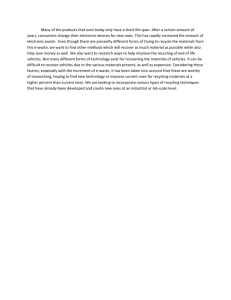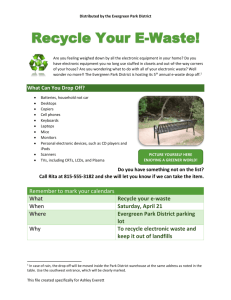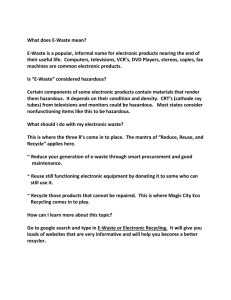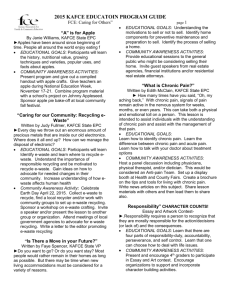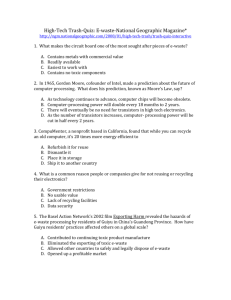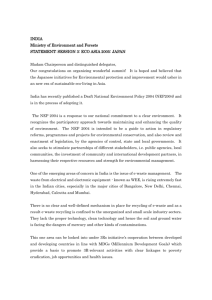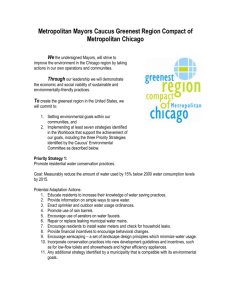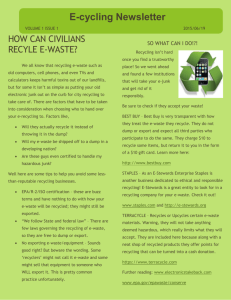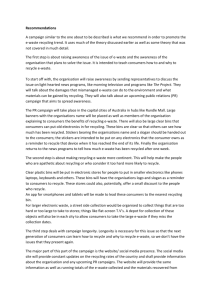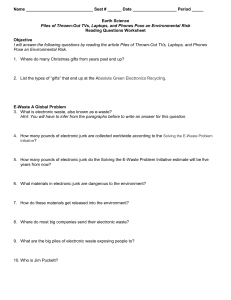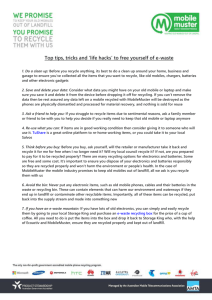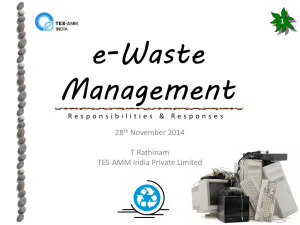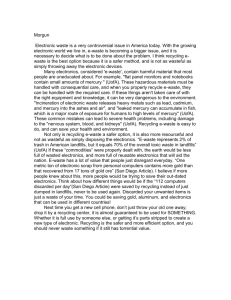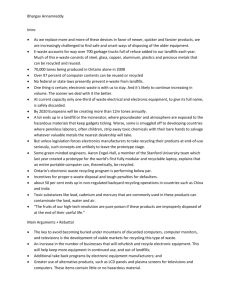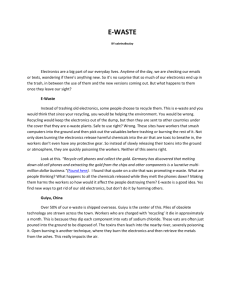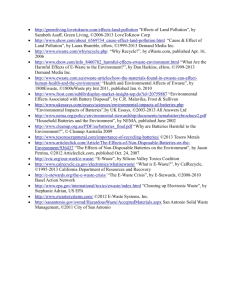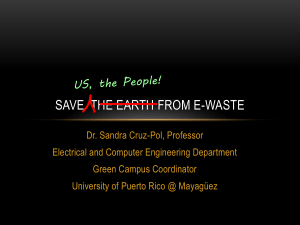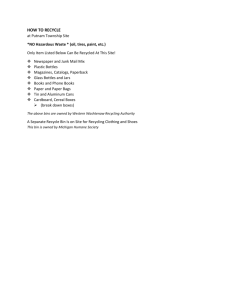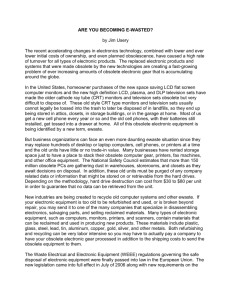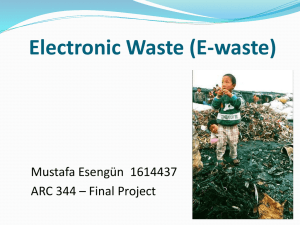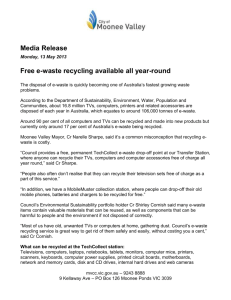Eryn - Teens Turning Green
advertisement
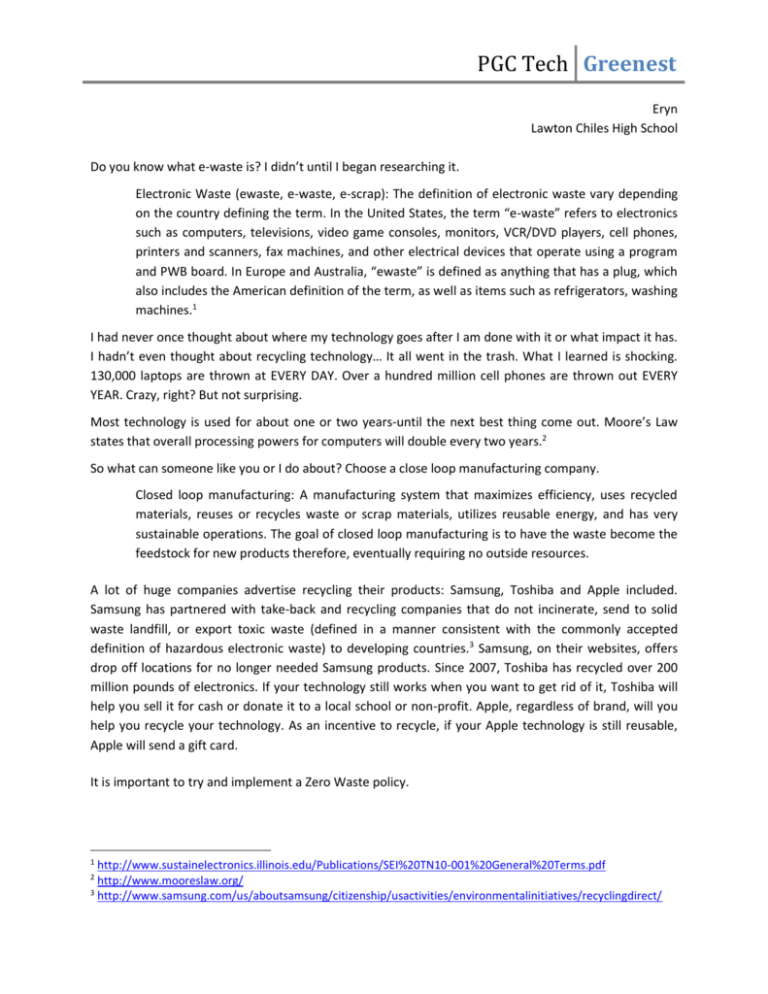
PGC Tech Greenest Eryn Lawton Chiles High School Do you know what e-waste is? I didn’t until I began researching it. Electronic Waste (ewaste, e-waste, e-scrap): The definition of electronic waste vary depending on the country defining the term. In the United States, the term “e-waste” refers to electronics such as computers, televisions, video game consoles, monitors, VCR/DVD players, cell phones, printers and scanners, fax machines, and other electrical devices that operate using a program and PWB board. In Europe and Australia, “ewaste” is defined as anything that has a plug, which also includes the American definition of the term, as well as items such as refrigerators, washing machines.1 I had never once thought about where my technology goes after I am done with it or what impact it has. I hadn’t even thought about recycling technology… It all went in the trash. What I learned is shocking. 130,000 laptops are thrown at EVERY DAY. Over a hundred million cell phones are thrown out EVERY YEAR. Crazy, right? But not surprising. Most technology is used for about one or two years-until the next best thing come out. Moore’s Law states that overall processing powers for computers will double every two years.2 So what can someone like you or I do about? Choose a close loop manufacturing company. Closed loop manufacturing: A manufacturing system that maximizes efficiency, uses recycled materials, reuses or recycles waste or scrap materials, utilizes reusable energy, and has very sustainable operations. The goal of closed loop manufacturing is to have the waste become the feedstock for new products therefore, eventually requiring no outside resources. A lot of huge companies advertise recycling their products: Samsung, Toshiba and Apple included. Samsung has partnered with take-back and recycling companies that do not incinerate, send to solid waste landfill, or export toxic waste (defined in a manner consistent with the commonly accepted definition of hazardous electronic waste) to developing countries.3 Samsung, on their websites, offers drop off locations for no longer needed Samsung products. Since 2007, Toshiba has recycled over 200 million pounds of electronics. If your technology still works when you want to get rid of it, Toshiba will help you sell it for cash or donate it to a local school or non-profit. Apple, regardless of brand, will you help you recycle your technology. As an incentive to recycle, if your Apple technology is still reusable, Apple will send a gift card. It is important to try and implement a Zero Waste policy. 1 http://www.sustainelectronics.illinois.edu/Publications/SEI%20TN10-001%20General%20Terms.pdf http://www.mooreslaw.org/ 3 http://www.samsung.com/us/aboutsamsung/citizenship/usactivities/environmentalinitiatives/recyclingdirect/ 2 PGC Tech Greenest Zero Waste: the concept of recycling all products and using 100% efficient systems to manufacture and use a product. Rather than throwing materials away at the end of their life, the waste is converted as feedstock into another production stream. 4 Now that you know what e-waste is, it is easy to stop e-waste from entering landfills. Next time you decide to purchase a new piece of technology, recycle your old one. Choose from a company that uses recycle equipment to make their products or companies that have excellent recycling programs. For another way to learn about e-waste, check out this video! http://www.youtube.com/watch?v=baDYHvvWA_I&feature=youtu.be 4 http://www.sustainelectronics.illinois.edu/Publications/SEI%20TN10-001%20General%20Terms.pdf
